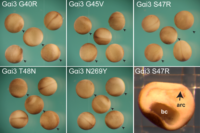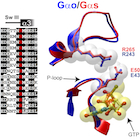Molecular mechanism of G protein activation by GIV, a protein that promotes metastasis
The insufficient mechanistic information on metastasis has precluded the development of efficient therapeutics for it. The Gα-Interacting, Vesicle-associtated (GIV) protein is emerging as a very promising candidate to become one of the “master regulators” of metastasis and as such, its characterization may open new avenues for therapeutic intervention.
By a combination of biochemical and structural techniques, including NMR, a team of researchers have uncovered the molecular mechanism behind GIV binding and activation of a G protein. G proteins are components of the communication system the body uses to sense hormones in the bloodstream and send the corresponding messages to cells.
The results show that the mode of action of GIV differs from the well known GPCR proteins, because it binds to a different region. Molecular modelling and NMR data inform about the protein-protein interface and show that GIV binds to a cavity on the surface of the G protein. These results suggest and allosteric regulation mechanism as conformational changes in one site propagate to another distant site in the molecule.
The work has been the result of a close collaboration between the group of Mikel García-Marcos at Boston University, and the group of Francisco J Blanco at CIC bioGUNE, and has appeared in the journal Nature Communications.
The synergy between the two teams, and the participation or researchers from IRB Barcelona, Cornell University, and University of Glasgow has made it possible to uncover this novel mode of action of a G protein regulator. Multidisciplinary studies of this kind are key to characterize the complex biological processes relevant in biomedical cancer research.
Reference: Molecular mechanism of Gαi activation by non-GPCR proteins with a Gα-Binding and Activating motif. A Ibáñez de Opakua, K Parag-Sharma, V DiGiacomo, N Merino, A Leyme, A Marivin, M Villate, LT Nguyen, MA de la Cruz-Morcillo, JB Blanco-Canosa, S Ramachandran, George S Baillie, RA Cerione, FJ Blanco, M Garcia-Marcos (2017) Nature Commun 8, 13935.
Mikel Garcia-Marcos receives Grunenbaum Faculty Award
The Grunebaum Faculty Research Fellowship funded by the Karin Grunebaum Cancer Research Foundation (http://www.grunebaumfoundation.org/) is an annual BUSM faculty award, which provides funds to a selected faculty member for a period of one year. In addition, upon request, the Foundation will provide up to $1,500 for the selected faculty member to travel to seminars and conventions related to their research. The RFA for 2017-2018 will be released in April 2017.
Fellowship Recipients
2015-2016
Neil Ganem, Ph.D.
Assistant Professor of Pharmacology and Medicine
Boston University School of Medicine
2016-2017
Mikel Garcia-Marcos, Ph.D.
Assistant Professor of Biochemistry
Boston University School of Medicine
New Research Discoveries—Mutant G Proteins and Disease
Congratulations to Arthur Marivin, Anthony Leyme and colleagues in the Garcia-Marcos lab who have reported a new mechanism of action for disease-associated G protein mutants in their recentScience Signaling publication and highlighted in a Podcast. They found that a rare hereditary disease is caused by G protein mutants that act as dominant negative proteins that block endothelin GPCR signaling during embryo development. This is the first example of a human disease caused by G protein mutants that arises from a dominant negative function.
Spotlight on Research—G proteins and disease
Congratulations to the Garcia-Marcos lab for their recent publication investigating the molecular basis for disease-linked mutations in G proteins. Heterotrimeric G proteins are molecular switches that control signal transduction. Many mutations in G proteins have been shown to cause human diseases. But not all these mutations are made equal. They found that two identical mutations can cause different diseases even if present in highly similar G proteins. By dissecting the biochemical properties of the different mutants, they elucidated the basis of how an identical mutation can make one G protein hyperactive in cancer and the second G protein inactive in rare inherited disease.
Congratulations Drs. Garcia-Marcos, Perissi and Ritter!
Drs. Garcia-Marcos, Perissi and Ritter have been accepted into the Early Career Faculty Development Program! This program brings faculty from the 3 schools on campus together to consider issues of importance to career development. Each applicant proposes a project that he/she hopes to accomplish during the tenure of the program. Each accepted applicant is assigned a mentor to help with the project. Congratulations to Drs. Garcia-Marcos, Perissi and Ritter!

